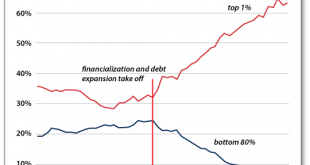At the end of The Rich Dad Radio Show there’s a segment called “Ask Robert.” Listeners submit their various investing questions and I’ll answer them.
“Am I diversified?” is a question that I get more than I’d like. Not because it’s a dumb question, but it’s because the person asking has been told at some point or another—probably a financial planner—that their “portfolio should be diversified.” And the way they mean it is bad advice.
What most people consider diversification isn’t really diversification. Rather it is spreading your money across one asset class. Most financial planners will tell you to invest in stocks, bonds, mutual funds, gold ETFs, REITs, and mutual funds.
In my opinion, the above portfolio is not diversified. It’s is filled with only one class of assets: paper assets. If the stock market crashes, which it will, diversification will not protect you. Gains in one class offset losses in another. Sure, it can be safe, but rarely does someone become wealthy by diversifying.
I was taught to diversify differently.
I own assets in different asset classes, not just in paper assets. For example, I do invest in oil, but I do not invest in oil company stocks.
I do invest in real estate. I do not invest in REITs, Real Estate Investment Trusts, a mutual fund for real estate. Although, I can see the value in them, especially for people starting their journey to wealth.
But, as Buffett himself says, “Diversification is protection against ignorance. [It] makes very little sense for those who know what they’re doing.”
Why Investors are Becoming Losers
In 2007, it disturbed me deeply to watch the stock market crash, knowing the consequences for millions of investors, investors who believed that the stock market always goes up over the long term and that diversification was insurance against losses.
Making matters worse, in 2010, uninsured investors were reentering the market, hoping prices would go up again (capital gains). They invested without insurance.
You do not drive a car without insurance. You do not buy a house without insurance. Yet when most investors invest, they do it without insurance. When the stock market crashed, they lost because they had no insurance.
The biggest losers in the last crash were investors who had their money, uninsured, in retirement plans, plans like the 401(k) in the United States. That is beyond risky. That is foolish.
We should all know the markets will crash again—it’s essentially a life-cycle—yet most investors invest without insuring their protection against that hit.
Amateurs vs. Professionals
This biggest difference between an amateur investor and a professional investor is:
- How they manage risk
- How they generate income (cash flow vs. capital gains)
Amateurs think they will earn their money in stocks from capital gains (buy low, sell high), and they manage their risk by diversification.
Professionals earn their money with cash flow strategies, and they manage their risk by diversifying across all asset classes.
In real estate, the battle cry is usually “location, location, location.” It seems that in paper assets the battle cry is “diversification, diversification, diversification.” In my opinion, no matter what your investment vehicle of choice is, the battle cry should be “cash flow, cash flow, cash flow.”
Real estate is a long-term hold. It’s not liquid. It’s always better as a long-term investment because of the appreciation and cash flow advantages. I don’t care if the market is up or down because I’m in for cash flow.
I make most of my money when the markets crash. I made most of my money in 2007. I made even more money in the subprime crash. I got great bargains.
I don’t care about the overall economy or the markets. I’m looking for an opportunity that no one else sees.
The mistake so many people make is that they think the investment is risky. It’s not the investment that’s risky. It’s the investor. Think about it. An investment is just an investment—whether it’s a business, a property, a stock share, or a commodity. It’s you, the investor, who determine if a specific investment is a good investment or bad investment for you.
Not every investment you choose will be a good investment. No investor has a 100-percent track record of picking winners. Yet the more knowledgeand experience you have, the better odds you have.
An Educated Investor Is an Insured Investor
Educated investors are proactive when it comes to asset protection. Always remember that the first rule of insurance is: You can’t buy insurance when you need it. You must always buy insurance before you need it. We know this.
When you purchase a piece of commercial real estate, acquiring insurance is easy. You simply buy it.
When investing in the stock market, you also have to learn to use insurance. For example, you need to learn how to use put options or call options. Options are not only a form of insurance; they are a form of leverage.
The story of David and Goliath was one of rich dad’s favorite stories. I suspect he may have seen himself as David, a man who started with nothing, yet rose to compete against the giants of business. Rich dad said, “David could beat Goliath because David knew how to use the power of leverage. A young boy and a simple slingshot were far more powerful than the feared giant, Goliath. That is the power of leverage.”
Rich dad said, “Cash flow is the most important term in the world of money. The second most important is leverage.” He also said, “Leverage is the reason some people become rich, and others do not.”
Rich dad went on to explain that leverage is power and that power can work in your favor or against you. Because leverage is power, some use it, some abuse it, and others fear it.
He said, “The reason less than 5 percent of all Americans are rich is because only 5 percent know how to use the power of leverage. Many who want to become rich, fail to become rich because they abuse the power. And most people do not become rich because they fear the power of leverage.”
If you want to be a good investor, regardless of what you invest in, you need to understand insurance, or protection from losses. Investing can have virtually no risk when you have insurance.
Regards,

Robert Kiyosaki
Editor, Rich Dad Poor Dad Daily
Source link
 Best Stock Hints Latest Tips To Buy & Invest Best Stocks Today
Best Stock Hints Latest Tips To Buy & Invest Best Stocks Today



